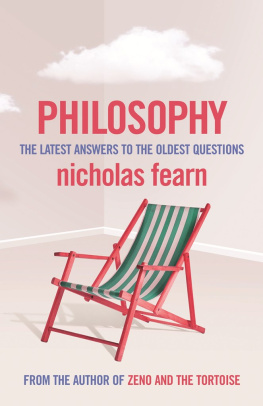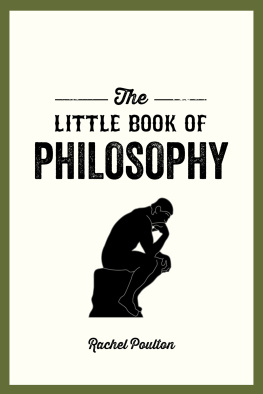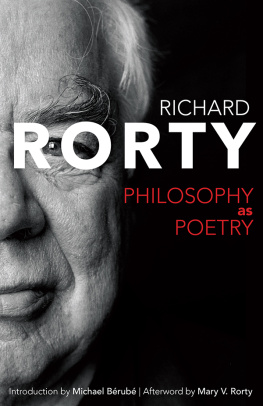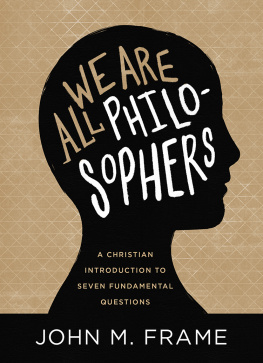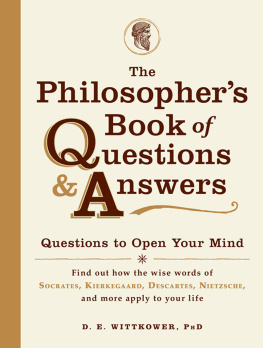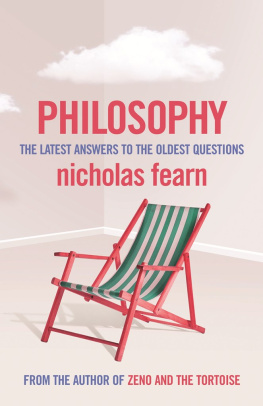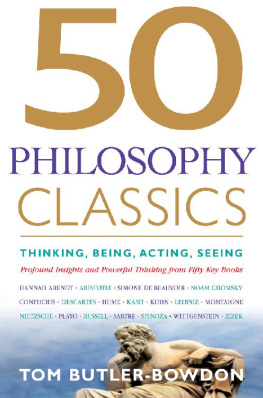Philosophy
Also by Nicholas Fearn
Zeno and the Tortoise: How to Think Like a Philosopher
First published in Great Britain in hardback in 2005
by Atlantic Books, an imprint of
Grove Atlantic Ltd.
Copyright Nicholas Fearn 2005
The moral right of Nicholas Fearn to be identified as the author of this work has been asserted in accordance with the Copyright, Designs and Patent Act of 1988.
All rights reserved. No part of this publication may be reproduced, stored in a retrieval system or transmitted in any form or by any means, electronic, mechanical, photocopying, recording or otherwise, without the prior permission of both the copyright owner and the above publisher of this book.
9 8 7 6 5 4 3 2 1
A CIP catalogue record for this book is
available from the British Library.
The author and publishers are grateful to the Los Angeles County Museum of Art (LACMA) for permission to reproduce La Trahison des Images by Ren Magritte on p. 94.
1 84354 066 5
eISBN 978 1 84887 255 4
Design by Lindsay Nash
Printed in Great Britain by CPD,
Ebbw Vale, Wales
Atlantic Books
An imprint of Grove Atlantic Ltd
Ormond House
2627 Boswell Street
London WC1N 3JZ
acknowledgements
I am grateful to Tim Crane for helping me to plan this book and to Alan Thomas for his scrutiny of the end result. The task would not have been possible without the generosity of the following, whom I would like to thank for their time and advice: Ruth Barcan Marcus, Ned Block, Nick Bostrom, Tyler Burge, Simon Critchley, David Chalmers, Noam Chomsky, Patricia Churchland, Paul Churchland, Daniel Dennett, Cian Dorr, Hubert Dreyfus, Stuart Dreyfus, Jerry Fodor, Alvin Goldman, Christine Korsgaard, Colin McGinn, Hugh Mellor, Ruth Millikan, Martha Nussbaum, David Papineau, Alvin Plantinga, Hilary Putnam, Richard Rorty, Thomas Scanlon, John Searle, Peter Singer, Charles Taylor, Peter Van Inwagen, Timothy Williamson. I am also indebted to the late Donald Davidson and Bernard Williams. Thanks finally to my editors Toby Mundy, Alice Hunt and Bonnie Chiang.
preface
All the interests of my reason, speculative as well as practical, combine in following three questions: (1) What can I know? (2) What ought I to do? (3) What may I hope?
Immanuel Kant
There is room for words on subjects other than last words. Indeed, the usual manner of presenting philosophical work puzzles me. Works of philosophy are written as though their authors believe them to be the absolutely final word on their subject.
Robert Nozick
The Great philosophers such as Aristotle, Immanuel Kant and Ludwig Wittgenstein achieved their status because they preferred revolution to evolution. They would rather introduce new ideas and systems than work with their predecessors materials. The result was that over two and half thousand years of philosophy, successive thinkers covered their subjects canvas with so many brushstrokes that no discernible image remained. Only lately has a restoration started to bear results. Layers have been removed and more naive cleanings discarded. Old impressions have been revealed as the ideas of ancient thinkers have gained new purchase, and contemporary inks have refreshed the strongest lines. This has been made possible by new techniques in the analysis of arguments, new ideas to test them on and new raw material provided by the sciences.
Now is an ideal time to take an audit of Western philosophy. This book assesses the current state of the philosophical art, taking a wide view of what has been achieved in recent years in the most hotly contested areas, and examines the latest approaches to problems that were first tackled in the ancient world. In order to complete my audit, I decided to consult a cross section of the main players in the key debates from various parts of the world. My task was made easier in the end by the concentration of most of the finest philosophical minds in a single if large place, the United States. It was made harder by the advanced age of the interviewees, several of whom, including Robert Nozick and W.V.O. Quine, died before I could get to see them. Most of those who survived were amenable, though some were more amenable than others. Several, such as David Chalmers, Jerry Fodor and Colin McGinn welcomed me into their homes, while others such as Thomas Nagel and Alasdair MacIntyre were so suspicious of journalists that they refused to speak to me. Daniel Dennett and Tyler Burge kindly allowed me second drafts and follow-up questions, while Jacques Derrida telephoned me before sunrise to decline to help when I was in no fit state to argue.
In the end I was able to interview over thirty of the worlds most prominent thinkers. After the first few meetings, I noticed that the conversation usually took the same direction. First they would inform me that, sadly, there had been little progress in philosophical understanding during their lifetime. Then they would begin a long exposition of evidence to the contrary. It seems that the typical modern philosopher is nothing if not modest. Philosophy has always suffered from excessive expectations, but if it is foolhardy to declare a final solution to any philosophical problem, it is equally rash to dismiss anything less as worthless. Over the past fifty years, revolution has gone out of fashion in the philosophical world. Answers have tended to come in a smaller size than those of the past as, cynics would add, have the thinkers who proffer them. Even cynics, however, would admit that technical ability is at an all-time high. A decent graduate student in the subject today should be able to hold his own in a debate against any illustrious thinker from the ancient world. There are fewer gurus, fewer giants, but a greater division of labour in an increasingly fragmented and specialized field. On the face of it there is little agreement among these disparate schools, but the consensus is often stronger than it seems, for once a field has been more or less wrapped up, the researchers who persist in working in it tend to be the eccentrics. For example, most scientists are satisfied that aliens have not been visiting the Earth in flying saucers recently, yet a survey of the specialist literature on alien abduction shows that the vast majority of so-called experts are firm believers in UFOs and little green men. This is because most scientists have better things to do than tackle questions that have already been settled within reasonable doubt.
Philosophy has entered a post-heroic age. Contemporary philosophers hope to advance our understanding incrementally as they build on a distributed achievement the work of over twenty-six thousand professionals worldwide according to the Philosophical Documentation Center informed by the latest work in the rest of the humanities and sciences. The role of the genius has diminished, perhaps because of a dearth of such individuals in recent years, perhaps due to the time it takes to recognize them as such, but more likely because the discipline has learned from its imperialistic mistakes. One of these mistakes is overreach. At the beginning of the nineteenth century, the German philosopher Georg Hegel used his philosophical system to predict that there could be only seven planets in the solar system. Today, one hopes, philosophers have a better idea of what can and cannot be achieved by reasoned argument. Neither do philosophers find it necessary to turn their subject on its head in order to solve philosophical problems. There is no need for revolution when constant, steady progress is already being made.
Next page
